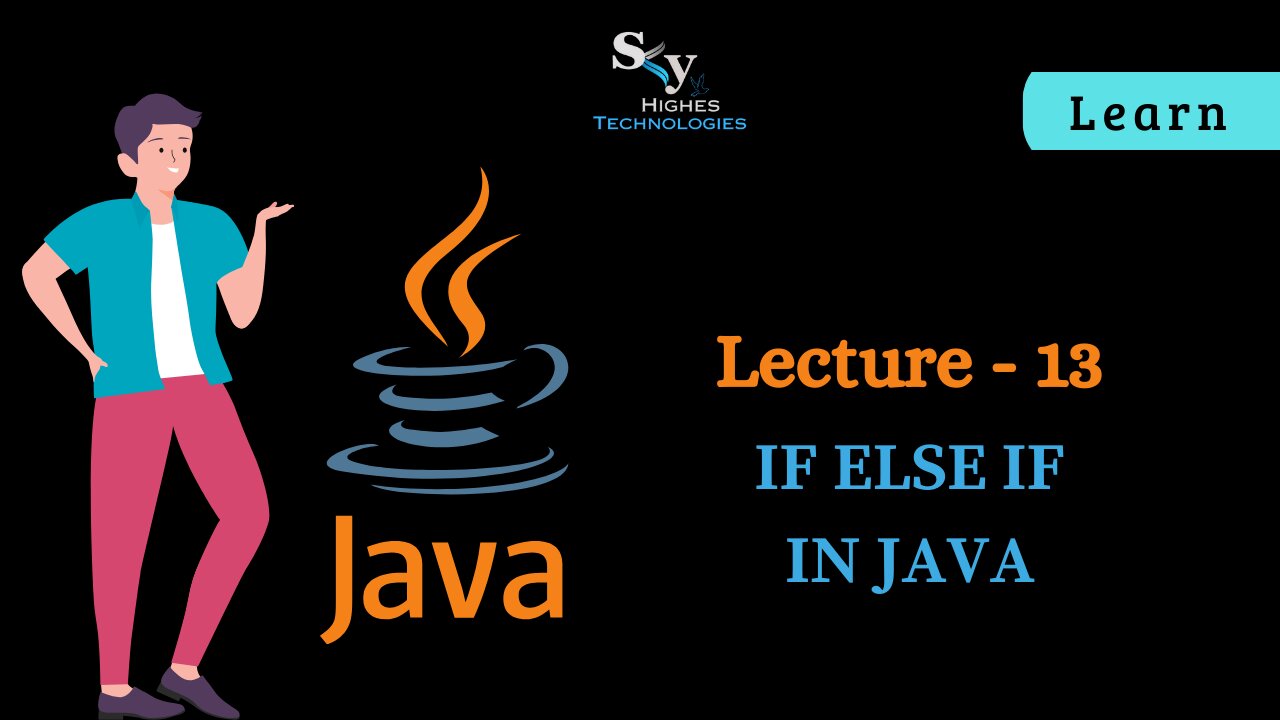Premium Only Content

#13 If Else If in JAVA | Skyhighes | Lecture 13
If-Else-If in Java: The Decision-Making Trio
Think of your Java code as a wise king in a kingdom, facing tough choices based on different situations. The if-else-if statements are the king's advisors, carefully analyzing conditions and suggesting the best course of action.
Let's break down their roles:
King - The if Statement:
Asks the first question: Evaluates a condition (true or false).
Decides the initial path: If the condition is true, the code block within the if statement is executed.
First Advisor - The else if Statement:
Offers alternative scenarios: Presents another condition to be checked if the if condition is false.
Guides the next step: If the else if condition is true, its corresponding code block runs instead of the if block.
Image of wise advisor whispering in the king's earOpens in a new window
satyamparamdheemahi.blogspot.com
wise advisor whispering in the king's ear
Second Advisor - Additional else if Statements (Optional):
More possibilities: You can chain multiple else if statements to consider even more conditions and offer specific responses for each.
Precise decision-making: Each else if acts as a separate advisor, providing a unique path based on its specific condition.
Final Option - The else Statement (Optional):
The catch-all solution: Provides a default code block to be executed if none of the if or else if conditions are met.
Ensures no gaps: Guarantees that the program always takes some action, even if none of the specific conditions apply.
Example:
Java
int score = 75;
if (score >= 90) {
System.out.println("Excellent! You got an A!");
} else if (score >= 80) {
System.out.println("Great job! You got a B!");
} else if (score >= 70) {
System.out.println("Good! You got a C!");
} else {
System.out.println("Keep practicing! You'll improve next time.");
}
Use code with caution. Learn more
Key Points:
Order matters! if comes first, followed by else if statements (in any order), and finally the optional else.
Each else if condition is independently evaluated, only executed if the previous conditions were false.
Use proper indentation for clear readability and to avoid confusion.
Remember: if-else-if statements empower your Java code to make informed decisions based on various scenarios. By mastering them, you'll transform your programs into intelligent beings, responding dynamically to the world around them. So, put on your kingly crown and start building impactful decision-making structures in your Java adventures!
Bonus Tip: Consider using switch-case statements for simpler scenarios with a limited number of distinct conditions.
-
 1:48:31
1:48:31
Squaring The Circle, A Randall Carlson Podcast
17 hours agoMEGA Tsunamis and the formation of our World ft. Dr. Dallas Abbot
13.5K4 -
 13:13
13:13
Mrgunsngear
15 hours ago $1.49 earnedStreamlight TLR-1 HP Review: Can It Dethrone Surefire?
8.59K8 -
 6:53
6:53
Rena Malik, M.D.
1 day ago $0.87 earnedWhy Antidepressants Wreak Havoc on Your Sex Life?! | Urologist Explains How to Boost your Libido
11K4 -
 1:00:00
1:00:00
BEK TV
2 days agoMIKE MOTSCHENBACHER ON NORTH DAKOTA POLITICS, TEA PARTY ROOTS, AND THE 2026 ELECTION
9.6K -
 15:31
15:31
Breaking Points
1 day agoIs Trump Planning VENEZUELA Regime Change?
33.1K21 -
 2:06:05
2:06:05
"What Is Money?" Show
2 days agoTrump Family Bitcoin Bet Will Trigger Nation-State FOMO w/ Matt Prusak (CEO American Bitcoin)
13.4K -
 1:04:36
1:04:36
Dialogue works
3 days ago $4.50 earnedMohammad Marandi: Iran Just Gave Israel a FINAL Warning…
23.4K6 -
 9:20
9:20
daniellesmithab
1 day ago3 Bad Laws
23.3K8 -
 9:22
9:22
MattMorseTV
19 hours ago $11.63 earnedINDIA just made a BIG MISTAKE.
65.1K60 -
 12:11
12:11
Nikko Ortiz
18 hours agoCrashout 6 Rumble
17.5K3